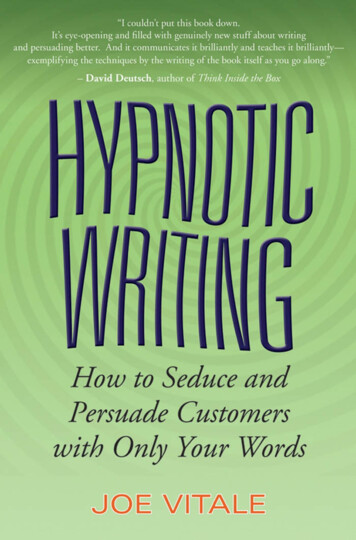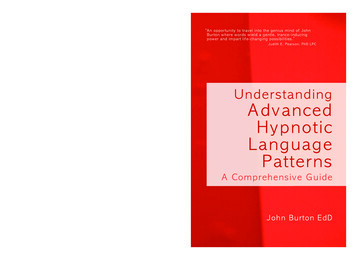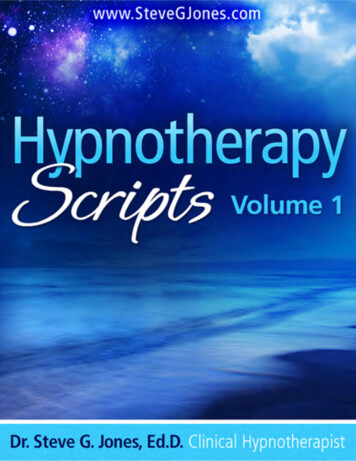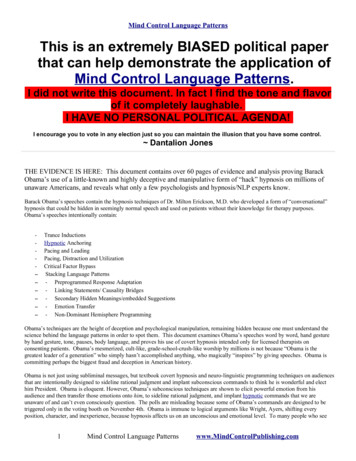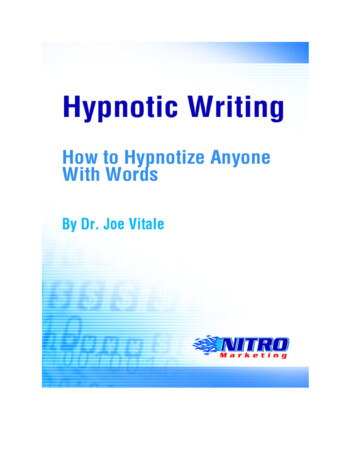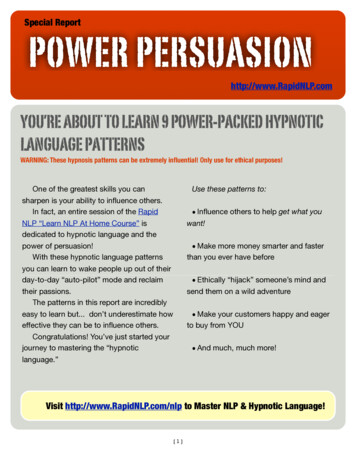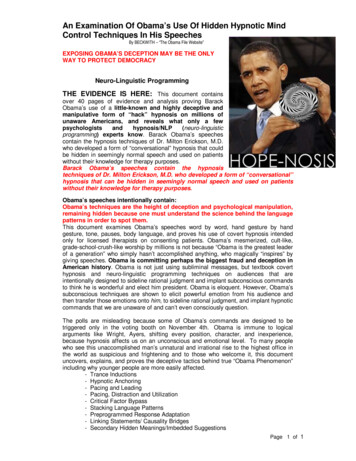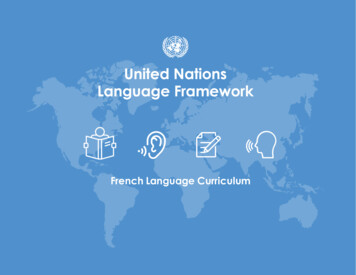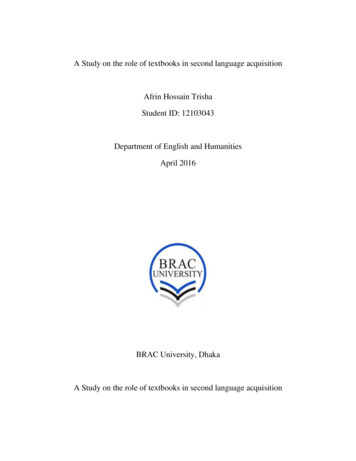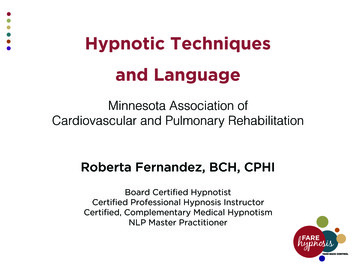
Transcription
Hypnotic Techniquesand LanguageMinnesota Association ofCardiovascular and Pulmonary RehabilitationRoberta Fernandez, BCH, CPHIBoard Certified HypnotistCertified Professional Hypnosis InstructorCertified, Complementary Medical HypnotismNLP Master Practitioner
All Hypnosis is Self-HypnosisA heightened stateof awareness and focus,where you are open to suggestions
Model of the MindLogicShort Term as5%AffirmationsCritical nscious and UnconsciousValuesBeliefs95%Life StoriesRulesLong Term MemoryBodily Processes
Conscious ulds”ConsciousShort Term MemoryIdeas
Subconscious sRulesLife StoriesLong Term MemoryImaginationIntuition
Age 7-12 Critical Factor95%Subconscious
Subconscious and Unconscious95%Critical FactorConscious5%
David Spiegel, MD“It’s [hypnosis] a very powerful means of changing theway we use our minds to control perception and ourbodies.”
Stanford StudyDefault Mode Network
DABC
The Power of Imagination
Thoughts become things.Choose wisely.
When Does Trance Happen? Waking state In pain In fear Severe stress Severe emotion - grief, depression, anger Induced
In hypnosis,you can decide how toexperience stress, pain, emotions
Words are Powerful“Words are, of course, the most powerful drug used by mankind.”— Rudyard Kipling Say nothing Use your words to harm Use your words to heal
Language and PerceptionThe Kansas Study, Erik WrightParamedics and EMTs trained to tell patients : The worst is over. We are taking you to the hospital. Everything isbeing made ready. Let your body concentrate on repairing itselfand feeling secure. Let your heart, your blood vessels, everything,bring themselves into a state of preserving your life. Bleed justenough so as to cleanse the wound, and let the blood vessels closedown so that your life is preserved. Your body weight, your bodyheat, everything, is being maintained. Things are being made readyin the hospital for you. We're getting there as quickly and as safelyas possible. You are now in a safe position. The worst is over. Were significant results. (Between control group and trained group) Patients were more likely to survive the trip, have shorterhospital stays and experience quicker recovery rates.
Words that Lead to FailureDr/Nurse PainPinchPokeStingPrickHurtTryBut?PT PainTightHardHurtBurnJust/only one moreTryBut?
Words that Lead to Success Discomfort/Comfort (use instead of pain)CanDoImagineNoticeAnd"You're going to feel me working here, or not”NEVER tell them whatthey are going to feel!
Tell Them What You Want Exact wording : Don’t you feel better? (than what?) Your right arm is feeling more comfortablethan it felt a few moments ago.Use positive words The discomfort in your right arm is feelingless painful The comfort level in your right arm inincreasing.Deliver with confidence - tone of voice
Techniques Language/words Direct suggestions Happy place Anchoring Breath
Techniques “Worst is Over” concept Distraction Pattern Interrupt Relaxation Techniques Words - reframe their negatives
Post Hypnotic Suggestions Restful sleep Less medication More relaxation in muscles Freedom of movement in joints (body part) Better/quicker recovery Remarks toward their goals (ex: easily pick upyour grandson)
Tools Relaxation and Compliance BP Induction Stethoscope Pen Light Incentive Spirometer Tone, Voice, Touch, and Language Look up
Stress and Pain ControlYour Breath
5,4,3,2,1 relaxTechnique
Take Back ControlPracticeWhat happens in your mind - new neural networksAka - HABITSWhat happens in your body - calm!
OpioidsAnd HypnosisRoberta@FAREHypnosis.com
Roberta Fernandez, BCH, CPHIBoard Certified HypnotistCertified Professional Hypnosis InstructorCertified, Complementary Medical HypnotismNLP Master Practitioner952-934-13158353 Crystal View Rd Suite 201Eden Prairie, MN 55344Roberta@FAREHypnosis.comwww.FAREHypnosis.com
Hypnotic Techniques and Language Roberta Fernandez, BCH, CPHI . Model of the Mind 5% 95%. Conscious Mind Conscious Logical Willpower Affirmations “Shoulds” Short Term Memory Analytical Ideas 5%. Subconscious Mind . way we use

